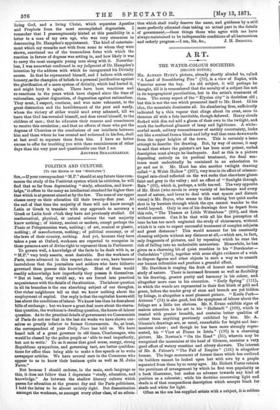POLITICS AND CULTURE.
[TO THE EDITOR OF THE "SPECTATOR.']
STE,—If your correspondent " M.P." should at any future time com- mence the study of the Positivist system which he criticizes, he will find that so far from depreciating "study, education, and know- ledge," it offers to the many an intellectual standard far higher than that which is at present aimed at by the few. The sons of our upper classes carry on their education till their twenty-first year. At the end of that time the majority of them will not know enough Latin or Greek to translate with any approach to accuracy a Greek or Latin book 1Thich they have not previously studied. Of mathematical, physical, or natural science the vast majority know nothing ; of history, ancient or modern, except perhaps the Punic or Peloponnesian wars, nothing ; of art, musical or plastic, nothing ; of manufactures, nothing ; of political economy, or of the laws of their country, nothing. And yet, because they have taken a pass at Oxford, workmen are expected to recognize in these persons a sort of divine right to represent them in Parliament.
To govern well, a knowledge of the facts to be dealt with is, as " M.P." very truly asserts, most desirable. But the workmen of Paris, more advanced in this respect than our own, have become incredulous that the journalists and soldiers who have hitherto governed them possess this knowledge. Most of them would readily acknowledge how imperfectly they possess it themselves. "But at least, they would say, we are forced into practical acquaintance with the details of the situation. The labour question in all its branches is the one absorbing subject of our thoughts. Our richer neighbours tell us that we know nothing about the employment of capital. Our reply is that the capitalist knows still less about the conditions of labour. We know less than he does about bills of exchange ; but we know a great deal more about the starva- tion question, the workmen's-dwelling question, the hours-of-labour question. As to the practical details of government we Communists of Paris do not see that in the last six weeks we have shown our- selves so greatly inferior to former Governments. So, at least, the correspondent of your Daily News has told us. We have beard talk of a great governor in old times, Charlemagne, who -would be classed by the police people as able to read imperfectly, but not to write.' To us it seems that good sense, energy, strong Republican sympathies, and governing tact, are better qualifica- tions for office than being able to make a fine speech or to write newspaper articles. We have several men in the Commune who appear to us to know their business quite as well as M. Jules Fevre."
But because I should endorse, in the main, such language as this, it does not follow that I depreciate "study, education, and knowledge." As between the shallow literary culture which passes for education at the present day and the Paris politicians, I hold the latter to be almost entirely right. But dissemination amongst the workmen, as amongst every other class, of an educa-
tion which shall really deserve the name, and guidance by a stilt more perfectly educated class taking no actual part in the detailm of government,—these things those who agree with me have always maintained to be indispensable conditions of all harmonious.
and orderly progress.—I am, Sir, &c., J. H. BRIDGES.


































 Previous page
Previous page